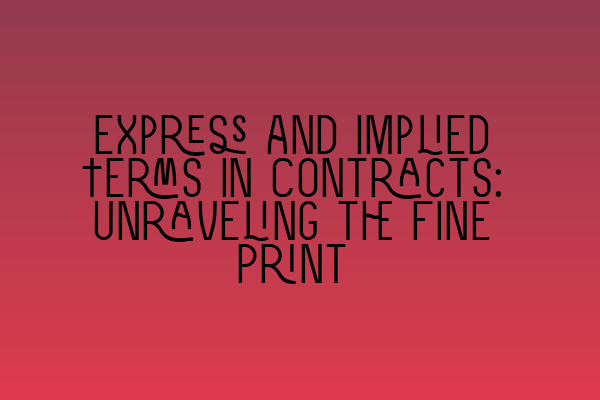Express and Implied Terms in Contracts: Unraveling the Fine Print
Introduction
Contracts are an integral part of any business transaction. Whether you are purchasing a product, hiring a service, or entering into a partnership, contracts serve as the foundation for the agreement between two parties. Within these contracts, terms and conditions govern the rights and obligations of each party involved. Understanding the distinction between express and implied terms is crucial for avoiding disputes and ensuring a smooth contractual relationship.
What are Express Terms?
Express terms are the specific provisions that both parties agree to in writing or verbally. These terms outline the core elements of the deal, including the obligations, responsibilities, and rights of each party. Express terms can be found in a variety of places, including:
1. Written Contracts: When entering into a formal agreement, it is common practice to document all terms and conditions in a written contract. These written contracts offer clarity and serve as a reference point in case of any disputes.
2. Offer Letters and Acceptance Emails: In some cases, express terms can be found in offer letters or acceptance emails, especially in situations where a formal written contract has not yet been drafted.
3. Verbal Agreements: Express terms can also be formed through verbal agreements, although it is generally advisable to put important terms in writing to avoid misunderstandings or disputes.
It is important to note that the express terms are legally binding and can be enforced by a court of law. Therefore, it is crucial for both parties to carefully review and understand these terms before signing any agreement.
What are Implied Terms?
Implied terms are not explicitly stated in the contract but are still considered part of the agreement. These terms are not agreed upon directly, but rather, they are assumed to be included based on common understanding, custom, or legal requirements. Implied terms can be categorized into two types:
1. Terms Implied by Law: These terms are automatically included in a contract by virtue of legislation or legal precedents. For instance, the Sale of Goods Act may imply terms regarding the quality and fitness for purpose of goods being sold.
2. Terms Implied by Fact: Terms implied by fact arise from the circumstances surrounding the contract. These terms are typically based on the intentions and expectations of the parties involved. For example, when hiring a professional service, there is an implied term that the service will be performed with reasonable care and skill.
The courts play a vital role in determining if any implied terms should be included in a contract. They rely on various factors such as the nature of the agreement, industry practices, and the intentions of the parties to determine the existence and scope of these terms.
Key Differences: Express vs. Implied Terms
The table below summarizes the key differences between express and implied terms:
| | Express Terms | Implied Terms |
|—————-|———————————————————|————————————————————|
| Formation | Agreed upon by both parties (written or verbal) | Assumed to be included |
| Enforceability | Legally binding and can be enforced by a court of law | Legally binding and can be enforced by a court of law |
| Clarity | Clearly articulated in the contract | May be subject to interpretation based on surrounding factors |
| Variation | Can be modified or added by mutual agreement | Difficult to modify or exclude unless expressly stated |
| Importance | Primary determinants of the contractual relationship | Supplemental to express terms |
Conclusion
In summary, express and implied terms play a significant role in contract law. Express terms are the specific provisions that are overtly agreed upon by both parties. On the other hand, implied terms are not expressly stated but are rather assumed based on legal requirements or common understanding.
Understanding the distinction between these two types of terms is vital for businesses and individuals who enter into contracts. By knowing and clearly articulating the express terms, parties can avoid misunderstandings and ensure that their rights and obligations are properly addressed. Similarly, being aware of the implied terms helps to establish fair and reasonable expectations, taking into account industry practices and legal requirements.
In any contractual agreement, it is always recommended to seek professional legal advice to ensure that all express and implied terms are properly addressed and understood. By doing so, parties can navigate the fine print of contracts with confidence, reducing the risk of disputes and promoting a healthy business relationship.
